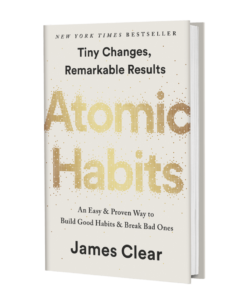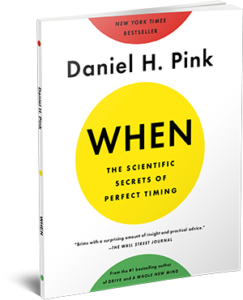 This was a really enjoyable book that was just crammed with examples and practical tips for re-framing how you think about your daily habits and the systems you set up for success. I’ve written the major (and many!) takeaways for me from the book below, but I HIGHLY recommend a full read to anyone who wants to change something about themselves – big or small. (And who doesn’t?) The author’s multitude of examples really help you visualize how to adapt his advice for your specific needs. It may seem like there’s a lot listed here, but I promise the book has so, so, much more. Whether you want to stop watching so much tv, finally write that novel or become a leader in your field, this is an incredibly useful guide to get you there.
This was a really enjoyable book that was just crammed with examples and practical tips for re-framing how you think about your daily habits and the systems you set up for success. I’ve written the major (and many!) takeaways for me from the book below, but I HIGHLY recommend a full read to anyone who wants to change something about themselves – big or small. (And who doesn’t?) The author’s multitude of examples really help you visualize how to adapt his advice for your specific needs. It may seem like there’s a lot listed here, but I promise the book has so, so, much more. Whether you want to stop watching so much tv, finally write that novel or become a leader in your field, this is an incredibly useful guide to get you there.
Why Are Habits Important?
- Habits are like compound interest. Getting 1% better every day counts a lot in the long run.
- The effect of one-off experiences tends to fade away, while the effect of habits gets reinforced with time, which means they shape your identity more than anything else. Your habits matter because they help you become the type of person you wish to be – every action you take is a one more step along this path, for good or ill.
- Small changes often appear to make no difference until you cross a critical threshold – be patient!
Make Things Obvious
- Set an intention by saying to yourself: I will (behavior) at (time) at (location). Ex: I will study for 20 mins in my bedroom….not just the unspecific “I’ll study more.”
- Link your desired behavior with something you already do every day. One you master this, start “chaining” smaller habits together: After I (old habit), I will (new habit). Ex: After I make my bed in the morning, I will place a book on my pillow so I will read later tonight.
- Change your environment so good habit cues are obvious and the cues to your bad habits are invisible – this is the key to self control. It’s easier to avoid a temptation than resist it.
Make New Habits Attractive
- Pair an action you want to do AFTER an action you need to do. This will get you through things you don’t like to be able to do the things you enjoy. Ex: Go for a bike ride after you process your bills.
- Join a culture where your desired behavior is the norm and you already have something in common with the group. (Ex: Stroller Strides!)
- Change a negative into a more positive mindset by changing the thought from “I have to” to “I get to” do this. Or, re-frame like: “It’s time to build endurance and get stronger” rather than “I have to go for a run.”
Make New Habits Easy
- The amount of time spent doing something is not as important as the number of times you have done it. Ex: Practicing an instrument for 10 minutes every day for a month is much better than practicing for 5 hours one day a month. You need the repetition to convert it to a habit.
- Think about any negative behavior that takes up a lot of time in your life and you’ll find it takes very little effort…endless social media scrolling, tv binge watching, etc. Make good habits more convenient so you’ll be more likely to do them for a better payoff in the long run. Design your (or your children’s…or your employee’s) world so it’s easier to do right (or harder to do wrong).
- Every day there are a few decisive moments that are fork in the road. The difference between a good day and a bad one is often just a handful of positive choices made at critical moments: making dinner instead of ordering takeout, going for a walk instead of playing a video game, etc. Focus on these small moments that have a big impact on your trajectory.
- Change the task so it’s harder to get out of the good habit than to get started. Ex: Pre-pay for gym sessions that would take more effort to get refunded than to just go do it.
Make Things Satisfying
- Incentives can start a habit but identity sustains a habit. Observe your transformation into the person you’d like to become to encourage yourself to continue.
- Track your habits to visualize your progress and try to keep your streak alive. However, give yourself permission to not be perfect. Missing once is an accident, but missing twice is the start of a new (bad) habit. The breaking of a habit doesn’t matter as much if the restarting of it is fast. Make sure you don’t miss twice in a row! Even if you have a bad time of it, that’s better than skipping it.
- There will always be bad/boring/draining days/tasks. Professionals stick to the schedule; amateurs let life get in the way.

 I didn’t intend to read/listen to this book, but I had seen it mentioned in a couple places lately and took a chance on it while browsing available audiobooks at my library.
I didn’t intend to read/listen to this book, but I had seen it mentioned in a couple places lately and took a chance on it while browsing available audiobooks at my library.